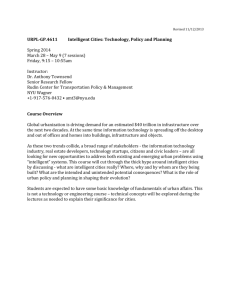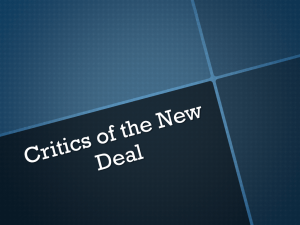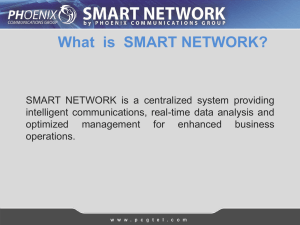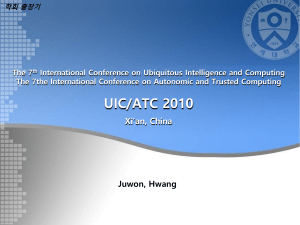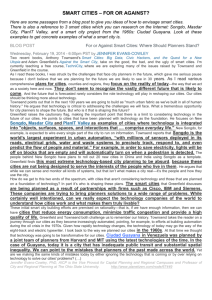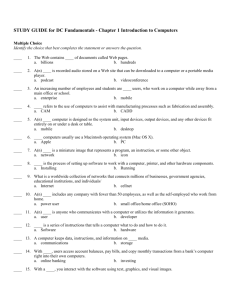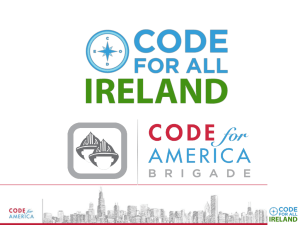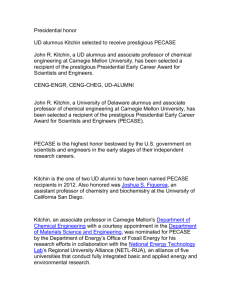syllabus for Spring 2015
advertisement
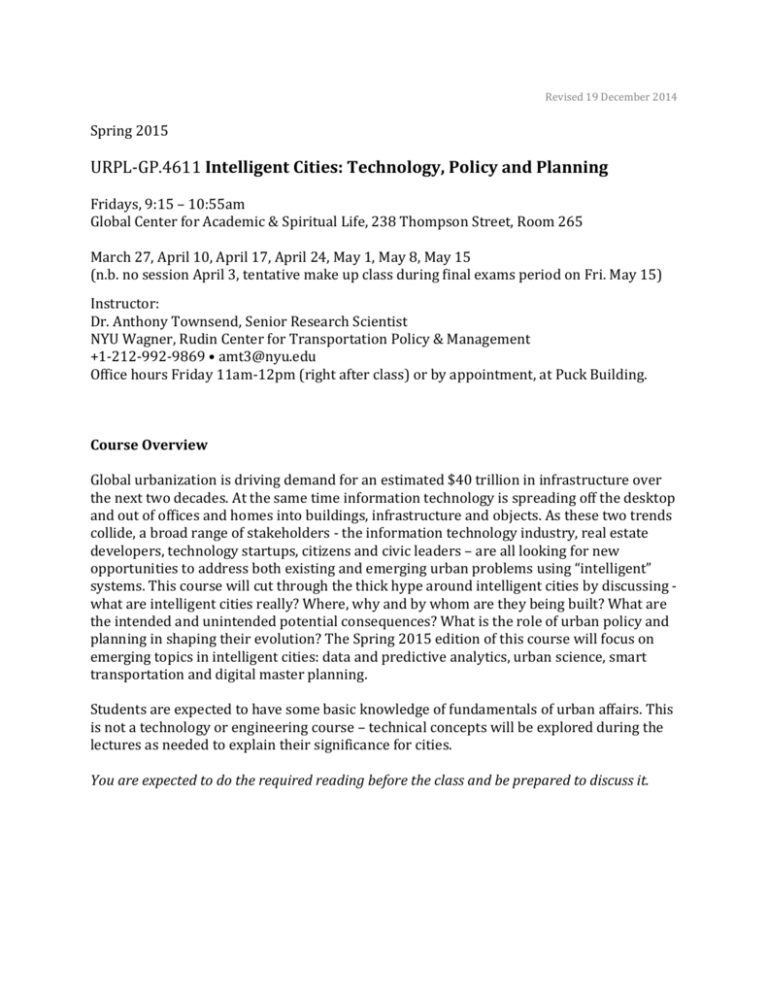
Revised 19 December 2014 Spring 2015 URPL-GP.4611 Intelligent Cities: Technology, Policy and Planning Fridays, 9:15 – 10:55am Global Center for Academic & Spiritual Life, 238 Thompson Street, Room 265 March 27, April 10, April 17, April 24, May 1, May 8, May 15 (n.b. no session April 3, tentative make up class during final exams period on Fri. May 15) Instructor: Dr. Anthony Townsend, Senior Research Scientist NYU Wagner, Rudin Center for Transportation Policy & Management +1-212-992-9869 • amt3@nyu.edu Office hours Friday 11am-12pm (right after class) or by appointment, at Puck Building. Course Overview Global urbanization is driving demand for an estimated $40 trillion in infrastructure over the next two decades. At the same time information technology is spreading off the desktop and out of offices and homes into buildings, infrastructure and objects. As these two trends collide, a broad range of stakeholders - the information technology industry, real estate developers, technology startups, citizens and civic leaders – are all looking for new opportunities to address both existing and emerging urban problems using “intelligent” systems. This course will cut through the thick hype around intelligent cities by discussing what are intelligent cities really? Where, why and by whom are they being built? What are the intended and unintended potential consequences? What is the role of urban policy and planning in shaping their evolution? The Spring 2015 edition of this course will focus on emerging topics in intelligent cities: data and predictive analytics, urban science, smart transportation and digital master planning. Students are expected to have some basic knowledge of fundamentals of urban affairs. This is not a technology or engineering course – technical concepts will be explored during the lectures as needed to explain their significance for cities. You are expected to do the required reading before the class and be prepared to discuss it. REQUIRED AND SUPPLEMENTAL READING Course Texts (Available at NYU Bookstore): Smart Cities: Big Data, Civic Hackers and the Quest for A New Utopia. Anthony M. Townsend. (W.W. Norton & Co., 2013) The Data Revolution: Big Data, Open Data, Data Infrastructures & Their Consequences. Rob Kitchin. (Sage, 2014). Additional Required Readings: There will be one additional required reading each week, you can download the entire package on the NYU Classes site for this course. COURSE WEBSITES Signals Blog: You need to setup an account on Medium (medium.com) for your class blog. We will be curating these as a collection. Medium is a very easy system for web publishing. I’ll give a brief demo in the first class. Anything you post here will be public. Let me know if you are not comfortable with this and we can make other arrangements to submit signals. Social Bookmarks: https://pinboard.in/u:anthonymobile/t:smartcities/- a huge collection of signals I have been tracking for the last year. Feel free to draw from here for your own signals and research. ASSIGNMENTS & GRADING Future Signals (5% per assignment, 25% of overall grade) For the second through sixth classes, students must submit a “signal” of a recent development in intelligent cities, related to the reading and the upcoming week’s topic. A signal is a news item, research paper, photograph, video or other content that represents a direction of change or emerging trend. Each signal should contain a pointer to the document (a URL, or APA-style citation) and a 200-250 word (1 page) synopsis highlighting the key development(s) in the signal, and your interpretation of its significance for urban policy, planning or design. You should choose and document the signals so that they are building on each other rather than being a random collection of links. In successive weeks, draw connections back to what you submitted in earlier weeks. Basically, you should think of this process as research and note-taking and idea refinement for your final paper. Signals are to be posted to your Medium account. ***SIGNALS ARE DUE THURSDAY AT NOON***. I need time to review them before class. Final paper (75% of grade) By May 18, 5pm, students must submit a written position paper of 8-10 pages (maximum 2500 words plus images and illustrations) examining some aspect of the following topics: The use of data/big data in urban research involving universities, city governments, citizen scientists, or some combination of them. The practice of long-range technology planning in local government. Your paper must be based on original research (i.e. primary documents, interviews, or objects – not media or blog syntheses). It should be expository – making an argument about the efficacy or deficiency of some intelligent city policy, planning or design issue or problem. Other kinds of design, technology or research projects will be considered by special request. CLASS FORMAT Each class will generally consist of: 20 minutes 30 minutes 40 minutes 10 minutes students volunteer or are called upon to share their signal instructor lecture on weekly topics discussion of lecture and readings tech/skills demo CLASS SCHEDULE March 27 (Week 1) Smart Cities and the Data Revolution: Past, Present and Future Historical relationship between urbanization and information technology – contemporary urbanization – rise of ubiquitous computing – the “smart cities” movement – key stakeholders – model “smart cities” in Korea and Abu Dhabi – big urban data – emerging conflicts and precedents in 20th urban policy, planning and design. Readings: Townsend, Preface, Introduction “Urbanization and Ubiquity”, Ch. 1 “The $100 Billion Jackpot” Kitchin, Ch. 1 “Conceptualising Data”, Ch. 4 “Big Data”, & Ch. 5 “Enablers and Sources of Big Data”. Survey: “Clever Cities”, The Economist, September 7, 2013. Tech demo: Setting up a Medium blog. Video: Strava and big data on bicycling http://www.theverge.com/2014/10/8/6939239/portland-biking-gets-some-helpfrom-big-data April 3 No Class. Make-up will be held during final exams period on May 15 April 10 (Week 2) Technology and Local Government ***1st signal due by Thursday 12pm. *** Local government emergent role as master integrator of smart city solutions – Application areas for technology-enabled infrastructure, service delivery and governance solutions – Leading cities – Open government movement and open data – Long-range technology strategy and digital master planning. Required Readings: Townsend, Ch. 7, “Reinventing City Hall” Kitchin, Ch. 3 “Open and Linked Data”, Ch. 7 “The Government and Business Rationale for Big Data” Choose one: The City of Chicago Technology Plan or A Digital Master Plan for Dublin Tech demo: Searching and downloading open government data from NYC Data Store. April 17 (Week 3) Urban Automation & Predictive Analytics ***2nd signal due by Thursday 12pm. *** Origins of cybernetics and computer simulation of cities and urban policy – the rise and fall of big urban models – evolution of GIS and planning support systems, decision-support systems – predictive urban analytics and big urban data – role of technology companies, think tanks, and universities as technical advisors to city governments – NYC MoDA – IBM’s Portland system dynamics model. Reading: Townsend, Ch. 2 “Cybernetics Redux” Kitchin, Ch. 6 “Data Analytics” Goodspeed, “Smart cities: moving beyond urban cybernetics to tackle wicked problems” Tech demo: TBD April 24 (Week 4) The Civic Tech Movement ***3rd signal & 1 paragraph final paper proposal due by Thursday 12pm. *** Linkages between grassroots urbanism and early Silicon Valley computing culture – smart city startups – hackathons and civic hackers – open source and open data – linked data – open hardware, and open networks – the case of NYU’s ITP program – prospects and evolution of civic tech movement. Reading: Townsend, Ch. 4 “The Open-Source Metropolis” and Ch. 5 “Tinkering Towards Utopia”, Ch. 8 first section on “Summer of Smart” Kitchin, Ch. 3, “Open and Linked Data” The Emergence of Civic Tech, Knight Foundation Tech demo: Field Trip to Civic Hall, meet with Andrew Raseij May 1 (Week 5) Urban Innovation: New Leadership Roles & Networks for Cross-Fertilization ***4th signal due by Thursday 12pm. *** Driving forces behind city government digital services and infrastructure innovation – new innovation leadership roles – responsibilities and initiatives they have pursued – emerging networks for harvesting, standardizing and cross-fertilizing good ideas for intelligent city policy, planning and design – CityMart and Code for America – the linkage between economic development policy and urban planning and local technology innovation clusters. Reading: Townsend, Ch. 8 “A Planet of Civic Laboratories”, remainder. New Tech City, Center for an Urban Future Tech demo: Using CityMart to find urban solutions. May 8 (Week 6) The Risks of Intelligent Cities ***5th signal due by Thursday 12pm. *** Flaws in smart city infrastructure and software – centralized vs. distributed/mesh digital infrastructure – “normal accidents” in complex technical systems – vulnerability of cellular networks during urban crises – opportunities and dilemmas around big data, cities and inclusion – pro-, para-, per-poor frameworks for technology and development in the Global South – personalization and customization vs. surveillance and tracking – evolving social norms and legal frameworks for privacy in smart cities. Readings: Townsend, Ch. 6 “Have Nots”, Ch. 9 “Buggy, Brittle and Bugged” Kitchin, Ch. 10 “Ethical, Political, Social and Legal Concerns” Richard Heeks, “ICT4D 2.0: The Next Phase of Applying ICT for International Development”. Tech demo: Mapping broadband access with government and independent data May 15 (Week 7) Intelligent Cities of the Future: Science and Design Smart cities as enablers of data-driven urban research – the new urban science, institutions and implications – social physics, past and present, critiques – citizen urban science movement – emerging models for collaborative university-government-citizen research – Patrick Geddes and the Garden City movement – civic principles for smart-city making – forecasting urban futures and future-proofing intelligent systems and policy. Reading: Townsend, Ch. 3 “Cities of Tomorrow”, Ch. 10 “A New Civics for Smart Cities” Kitchin, Ch. 8 “The Reframing of Science, Social Science, and Humanities Research” Townsend, “Cities of Data: Examining the New Urban Science”, Public Culture. **** FINAL PAPERS DUE Monday May 18 , 5pm****
